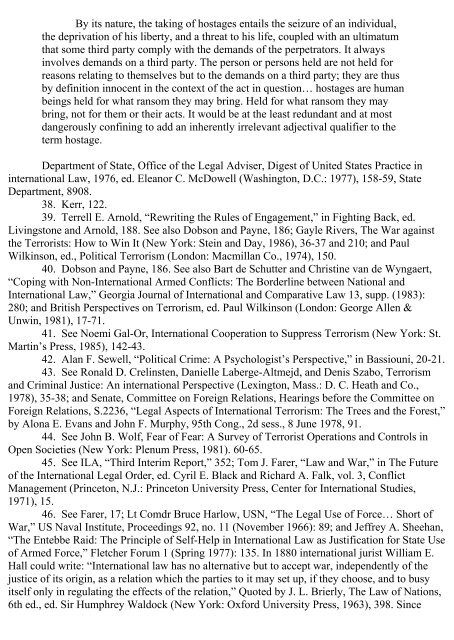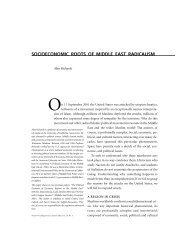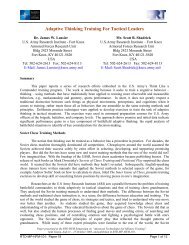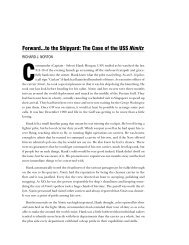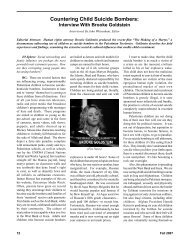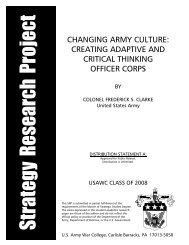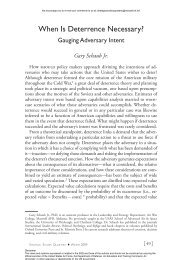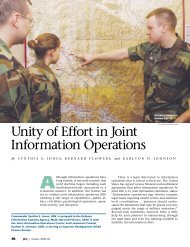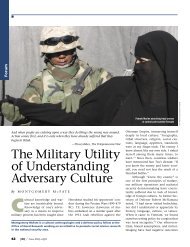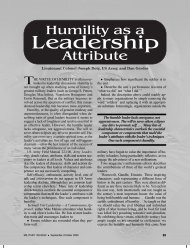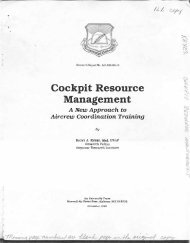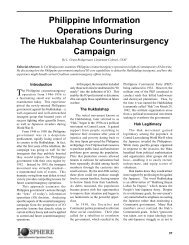Legitimate use of military force against state-sponsored - Air University
Legitimate use of military force against state-sponsored - Air University
Legitimate use of military force against state-sponsored - Air University
Create successful ePaper yourself
Turn your PDF publications into a flip-book with our unique Google optimized e-Paper software.
By its nature, the taking <strong>of</strong> hostages entails the seizure <strong>of</strong> an individual,<br />
the deprivation <strong>of</strong> his liberty, and a threat to his life, coupled with an ultimatum<br />
that some third party comply with the demands <strong>of</strong> the perpetrators. It always<br />
involves demands on a third party. The person or persons held are not held for<br />
reasons relating to themselves but to the demands on a third party; they are thus<br />
by definition innocent in the context <strong>of</strong> the act in question… hostages are human<br />
beings held for what ransom they may bring. Held for what ransom they may<br />
bring, not for them or their acts. It would be at the least redundant and at most<br />
dangerously confining to add an inherently irrelevant adjectival qualifier to the<br />
term hostage.<br />
Department <strong>of</strong> State, Office <strong>of</strong> the Legal Adviser, Digest <strong>of</strong> United States Practice in<br />
international Law, 1976, ed. Eleanor C. McDowell (Washington, D.C.: 1977), 158-59, State<br />
Department, 8908.<br />
38. Kerr, 122.<br />
39. Terrell E. Arnold, “Rewriting the Rules <strong>of</strong> Engagement,” in Fighting Back, ed.<br />
Livingstone and Arnold, 188. See also Dobson and Payne, 186; Gayle Rivers, The War <strong>against</strong><br />
the Terrorists: How to Win It (New York: Stein and Day, 1986), 36-37 and 210; and Paul<br />
Wilkinson, ed., Political Terrorism (London: Macmillan Co., 1974), 150.<br />
40. Dobson and Payne, 186. See also Bart de Schutter and Christine van de Wyngaert,<br />
“Coping with Non-International Armed Conflicts: The Borderline between National and<br />
International Law,” Georgia Journal <strong>of</strong> International and Comparative Law 13, supp. (1983):<br />
280; and British Perspectives on Terrorism, ed. Paul Wilkinson (London: George Allen &<br />
Unwin, 1981), 17-71.<br />
41. See Noemi Gal-Or, International Cooperation to Suppress Terrorism (New York: St.<br />
Martin’s Press, 1985), 142-43.<br />
42. Alan F. Sewell, “Political Crime: A Psychologist’s Perspective,” in Bassiouni, 20-21.<br />
43. See Ronald D. Crelinsten, Danielle Laberge-Altmejd, and Denis Szabo, Terrorism<br />
and Criminal Justice: An international Perspective (Lexington, Mass.: D. C. Heath and Co.,<br />
1978), 35-38; and Senate, Committee on Foreign Relations, Hearings before the Committee on<br />
Foreign Relations, S.2236, “Legal Aspects <strong>of</strong> International Terrorism: The Trees and the Forest,”<br />
by Alona E. Evans and John F. Murphy, 95th Cong., 2d sess., 8 June 1978, 91.<br />
44. See John B. Wolf, Fear <strong>of</strong> Fear: A Survey <strong>of</strong> Terrorist Operations and Controls in<br />
Open Societies (New York: Plenum Press, 1981). 60-65.<br />
45. See ILA, “Third Interim Report,” 352; Tom J. Farer, “Law and War,” in The Future<br />
<strong>of</strong> the International Legal Order, ed. Cyril E. Black and Richard A. Falk, vol. 3, Conflict<br />
Management (Princeton, N.J.: Princeton <strong>University</strong> Press, Center for International Studies,<br />
1971), 15.<br />
46. See Farer, 17; Lt Comdr Bruce Harlow, USN, “The Legal Use <strong>of</strong> Force… Short <strong>of</strong><br />
War,” US Naval Institute, Proceedings 92, no. 11 (November 1966): 89; and Jeffrey A. Sheehan,<br />
“The Entebbe Raid: The Principle <strong>of</strong> Self-Help in International Law as Justification for State Use<br />
<strong>of</strong> Armed Force,” Fletcher Forum 1 (Spring 1977): 135. In 1880 international jurist William E.<br />
Hall could write: “International law has no alternative but to accept war, independently <strong>of</strong> the<br />
justice <strong>of</strong> its origin, as a relation which the parties to it may set up, if they choose, and to busy<br />
itself only in regulating the effects <strong>of</strong> the relation,” Quoted by J. L. Brierly, The Law <strong>of</strong> Nations,<br />
6th ed., ed. Sir Humphrey Waldock (New York: Oxford <strong>University</strong> Press, 1963), 398. Since


